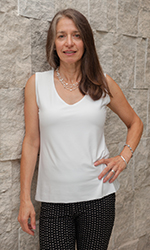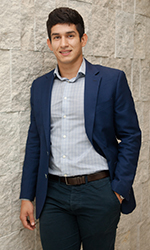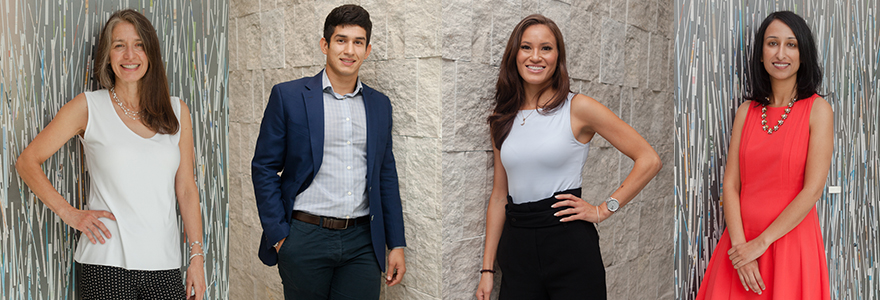Meet the PhD Candidates conducting their work in Family Medicine
Meet Dr. Helena Piccinini-Valiis
 Where were you born and raised? I was born in São Paulo, Brazil, and raised in Brazil, the USA, Switzerland, and then Canada.
Where were you born and raised? I was born in São Paulo, Brazil, and raised in Brazil, the USA, Switzerland, and then Canada.
What degree(s) do you have, and from what universities? BSc from MUN, MSc from Dalhousie, MD from Dalhousie.
Where do you practice medicine and in what scope? I practice in an academic setting. I do lots of clinical and non-clinical teaching with a variety of learners, ranging from 1st year medical students to 2nd year residents in family medicine, psychiatry and dermatology. My research interest pertains to the management of weight, primarily during pregnancy.
What special interests or hobbies do you have? Gardening and competitive swimming. I compete locally, nationally and internationally.
Why did you choose to pursue a PhD in the Department of Family Medicine at Schulich Medicine & Dentistry? A PhD in my own discipline that I could do part-time and from home seemed like the perfect fit.
Can you tell me about your experience in the program? Although this is taking me much longer than I had anticipated, I have learned an enormous amount and sometimes feel like a different person. There is one course that I would actually like to repeat (!) - probably the most interesting, thought-provoking course I have ever taken…Theoretical Foundations of Family Medicine.
What inspires you in your work? Mentoring students and colleagues who are interested in undertaking research.
What has been your greatest experience to date in your practice/ research? Too many great experiences to count! I love my job.
What three words best describe you? Approaching PhD completion.
Meet Narlon Cassio Boa Sorte Silva
 Where were you born and raised?
Where were you born and raised?
I was born in the interior of the State of Bahia, Northeastern region of Brazil. My hometown, Riacho de Santana, is where I was raised with my two brothers in a very simple and humble family.
What degree(s) do you have, and from what universities?
I have a Bachelor of Science (BSc) degree in Physical Education and Exercise Science from the Universidade Nove de Julho (2014), in Sao Paulo, Brazil. I began the Master of Science (MSc) program in Kinesiology at Western University in 2015, with an early transference to the Doctor of Philosophy (PhD) program in 2017.
What are your research interests? Can you speak to conducting your work in Family Medicine and collaborating with our Department.
My research interests encompass, essentially, the investigation of non-pharmacological interventions to improve cognitive function and reduce cardiovascular risk factors burden in community-dwelling older adults at risk for dementia. More specifically, my research focuses on the effects of combined types and intensities of physical exercise and mind-motor training on global and domain-specific cognitive function, brain structural and functional adaptations via neuroimaging, and cardiovascular health and fitness. Our target population includes older adults with objective cognitive impairment, as well as those with hypertension and subjective cognitive decline.
Applying a pragmatic approach to resolve real-world issues in health and aging is in the core of my research. I believe that exploring the influence of non-pharmacological interventions to aid in prevention and/or mitigation of chronic diseases, such as Alzheimer’s disease and hypertension, is closely aligned with the goals of primary care in family medicine research. I am honoured to be developing my research activities under the supervision of Dr. Petrella and his capable team, which enables the development of my research without ever losing sight of its relevance to the Centre for Studies in Family Medicine.
What special interests or hobbies do you have?
I am very much interested in science and technology, health promotion, politics and astrophysics. I also workout regularly, write poetry occasionally, and I love cooking.
Why did you choose to pursue a PhD at Western?
While still in undergraduate school, I was given a “once in a lifetime” opportunity to participate in an internship in Canada in the Summer of 2014 in Dr. Petrella’s laboratory, via the Mitacs Globalink Research Internship Award. Dr. Petrella and his team received me with open arms at Western, they guided me and taught me more about research in aging over the course of my 3-month internship. At the end of my internship, Dr. Petrella introduced me to the idea of applying to the MSc program in Kinesiology at Western. The MSc program then became a PhD program and brought me to where I am now. Working alongside Dr. Petrella was definitely the main reason why I took that opportunity, and is the main reason why I continued in the program.
Can you tell me about your experience?
It certainly has been a great experience being part of The Lifestyle Research Team at the Centre for Studies in Family Medicine as I pursue my PhD degree. I have developed skills that I believe will be essential to my career, such as performing my work at a high level of quality and complexity, in a timely manner with a high degree of collaboration within our team, as well as other teams in Canada and around the world. Above all, I am most grateful for working alongside individuals with exemplary work ethic and brilliance, with whom I can learn on a daily basis. Here I would like to specially acknowledge the positive influence of Dr. Dawn Gill, Roseanne Pulford and Wendy Blunt. It’s not unexpected that Dr. Petrella has carefully selected the members of his team over the years, based on their capabilities and proven potential for further development. We learn mutually with our experiences and, as the youngest member of the team, I have the invaluable opportunity to learn the most. Over the past few years, I have had the honour to travel the world to present the results of our work in research conferences, I have authored and collaborated in original research articles, assisted in other research projects, and I have been fortunate to receive competitive scholarships for my graduate pursuits. All of this would not have been possible without the support and encouragement of my peers in the Lifestyle Research Team. I also would like to acknowledge that everyone in the School of Kinesiology, and in the other teams that compose the Centre for Studies in Family Medicine, has been overly supportive of my research.
What inspires you in your work?
I was raised by my grandmother and she has always been the greatest person I know. She had little to no formal education, suffered through the toughest times living in one of the poorest and driest regions of Brazil, raising her children in a little house on a small farm. She educated me, taught me right from wrong, and made me believe in a brighter future for myself. When my father, her son, passed away at the age of thirty-nine, I was not afraid because she was there. She was my best example of how to deal with suffering and overcome hardship.
Two years ago, when I called her on Christmas Day, she did not recognize my voice, she was confused and could not remember who I was. I am not sure of what her diagnosis would be, probably sporadic Alzheimer’s disease. She is one of the examples of many other families that struggle with Alzheimer’s disease and other dementias. These are the people for whom I dedicate my efforts every second of every day, and they are the ones motivating my late hours at work, which very often get extended over my weekends. My grandma taught me with her own life story that there are unique individuals in the world capable of making incredibly positive contributions to one’s life. I want to be one of them. I want to be like her. That is what inspires me in my work.
What has been your greatest experience to date in your research?
Fortunately, many great things have happened over the past three years in my research at Western. Although, nothing has been greater that working alongside Dr. Petrella and Dr. Gill in developing and implementing our new project, “The Heart and Mind Study”, which will be fully funded by the Heart and Stroke Foundation of Canada. In this project, we will investigate over two years the effects of mind-motor training and high-intensity interval training in older adults with subjective cognitive decline and hypertension. We hope this project will contribute to research in mitigating the risk factors for Alzheimer’s disease, vascular dementia and types of neurodegenerative disorders. I am looking forward to seeing what the results of this project will reveal to us and how we can translate that to the community, with the overarching goal of imparting significant change.
What three words best describe you?
Ambitious, passionate, and curious.
Meet Dr. Kamila Premji
 Tell me a little about you
Tell me a little about you
I’m a family doctor living and working in Ottawa, Ontario, the beautiful capital city of Canada.
Where were you born and raised?
I was born in Toronto and raised in Mississauga.
What degree(s) do you have, and from what universities?
- BSc – McGill University
- MD – Western University
- Family Medicine Residency – University of Toronto
- Clinician Scholars Fellowship – University of Ottawa
- Currently a PhD candidate at Western
Where do you practice medicine and in what scope? (If applicable) What are your research interests? Can you speak to conducting your work in Family Medicine.
I practice comprehensive family medicine with 10 other family doctors in a community-based practice located in the heart of downtown Ottawa. I provide care to about 1,200 patients who come from all walks of life and from a range of areas within and surrounding Ottawa.
I’m interested in research that informs primary care policy around the organization and delivery of services. Most of my work to date has focused on access to primary care and quality measurement. This has led me into the area of “pay-for-performance”, a concept that is increasingly prevalent in health care and around which there is significant controversy for scientific, economic, and ethical reasons.
What special interests or hobbies do you have?
- Traveling – still working on reaching every continent but getting close!
- Leadership, particularly for women physicians – I’m currently Board Chair for a new, national not-for-profit organization called Canadian Women in Medicine. Our mandate is to support women physicians across Canada in their personal and professional goals
- Reading – especially fiction and literary nonfiction
- Writing – I’ve recently gotten into blogging and have written a few pieces for the online health policy forum called Healthy Debate
- Spending time with family and friends.
Why did you choose to pursue a PhD in the Department of Family Medicine at Schulich Medicine & Dentistry?
I’ve always had an interest in research and participated in various projects throughout my undergraduate years, medical school, and residency. After a few years in clinical practice, I noticed that I missed that part of my work. I was graciously welcomed into the research world of fantastic Ottawa mentors like Dr. Simone Dahrouge, Dr. Bill Hogg, and Dr. Kevin Pottie. They encouraged me to expand my research skills through Western’s MClSc program, a program that Drs. Hogg and Pottie had previously completed themselves. Once I started the program, I loved it. With support from the program’s faculty and Chair, I was able to gain skills that enabled me to better contribute to primary care research. It’s exciting to help create knowledge that could improve lives on a broad scale through health policy. After completing two years in the MClSc program, I decided I wanted to continue honing my research skills so I applied to transfer into the PhD program.
Can you tell me about your experience in the program?
Not only is the program patient-centred but it’s also exceptionally student-centred. There’s a noticeable atmosphere of support and encouragement, and a palpable positive energy. Our teachers are knowledgeable, passionate, and truly care about their students’ success. The patient-centred approach to the curriculum ensures that our work remains rightly focused on the patient. Our classmates come from across the country and around the world, which creates an especially unique opportunity to learn from the experiences of family doctors across a broad range of health care systems.
What inspires you in your work?
I’m inspired by everyday experiences practicing clinical medicine in the most common setting for primary care delivery in Canada: the community. I see challenges facing patients, their families, colleagues, and the system, and I feel an urge to help make things better. I see policies that seem driven by politics over evidence and want to help influence decision-makers. I see successes in small scale that I want to help nurture and disseminate into large scale initiatives. I believe strongly in a robust primary care system as the foundation for any high-performing health system and want to contribute in whatever small ways I can to improving ours here in Canada.
What has been your greatest experience to date in your practice/ research?
Working closely with outstanding research mentors and watching the work we’ve done reach the eyes and ears of decision-makers in government and professional circles. This has been both inspiring and a great learning experience around transforming knowledge into practice.
What are your beliefs about Department of Family Medicine’s patient-centred care approach?
The patient-centred care approach permeates all aspects of the curriculum and grounds everything we do in the right place: the patient. This approach helps prevent us from losing track of the fundamental reason for our work, be it clinical, teaching, or research: to benefit our patients and, in turn, families and communities.
What three words best describe you?
Curious, thoughtful, energetic.









